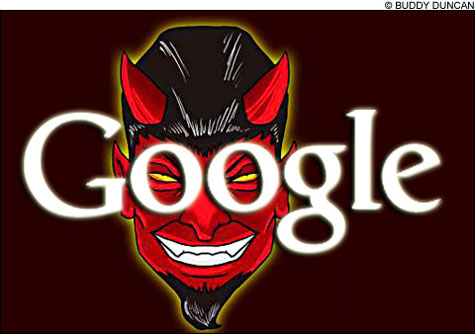 |
| "Don't Be Evil Google" image by Buddy Duncan, as posted on The Boston Phoenix "Phlog" |
For months, I've been looking for her entry in Who's Who, unsuccessfully, though our university library has rows upon rows of shelves housing copies of several of its imprints. And, just a month or two ago, I'd thoroughly exhausted all "Eleanor Youmans" searches (and its variants), including those within Google Books. Now, seemingly overnight, there is a whole host of hits that never surfaced before.
Turns out, Youmans first appears in a 1937 volume of American Women: The Official Who's Who Among the Women of the Nation. From this entry, I learned the titles of two other magazines in addition to Child Life in which she published short stories, one being Junior Home, and the other The Animals' Magazine (based in London, and which I'm fairly certain is the title of the English magazine that "copied" her early Cat Courier stories, inspiring her to pursue novel writing). The Who's Who blurb also narrows her location during her year-long residence in California specifically to Santa Barbara. Other "snippet" references lead to an article she wrote for The Writer in 1928, several more book reviews, quite a few mentions of her work in curriculum guides, and three more short stories anthologized in two Bobbs-Merrill readers.
I'm taking an Electronic Texts course this semester, and about to begin a research assistantship with UNL's Center for Digital Research in the Humanities, so I'm looking forward to learning more about the moral and technical issues implicit in the Google Books Settlement--and in digital archiving in general. Though I have a deep enthusiasm for Eleanor and her writing, enjoy creating a space where I can bring together the information I'm discovering about her, and hope to make her work more accessible to a larger audience, I'm often dubious about revealing too much on the web. I don't want to infringe on any copyrights of book reviews or library holdings, or make public that which should be kept private. Plus, if I've just spent hours, months, or even years talking with people in the know, applying for competitive library residencies, trekking cross-country to view elusive materials, scanning rare documents and images, do I really just want to give it up to the public realm so easily? And yet, isn't sharing and disseminating knowledge--especially if it fosters greater enthusiasm and appreciation--the whole point? Whatever the answer, in an ever-increasingly online world, the ease of posting otherwise hard-to-find material sometimes feels to me a bit slippery.
No comments:
Post a Comment